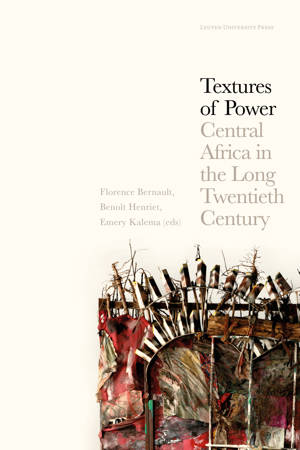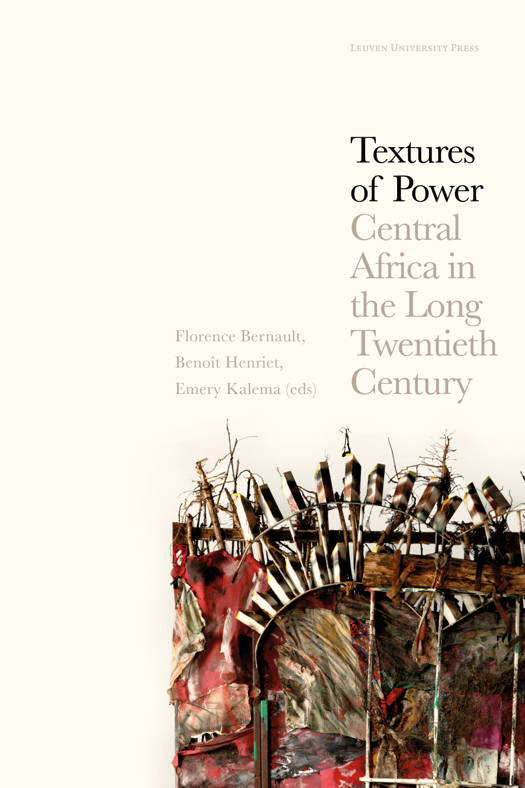
- Retrait gratuit dans votre magasin Club
- 7.000.000 titres dans notre catalogue
- Payer en toute sécurité
- Toujours un magasin près de chez vous
- Retrait gratuit dans votre magasin Club
- 7.000.0000 titres dans notre catalogue
- Payer en toute sécurité
- Toujours un magasin près de chez vous
Textures of Power
Central Africa in the Long Twentieth Century
Marcos Abreu Leitão de Almeida, Philippe Ambata, Alice Atérianus-Owanga, Sylvie Ayimpam, Michel Bisa, Fred Biyela, Jacky Bouju, Pedro Cerdeira, Andrea Ceriana Mayneri, Melchisedek Chetima, Maxime de Formanoir, Valentine Dewulf, Peter Geschiere, Etienne Gontard, David Gordon, Charlotte Grabli, Enid Guene, Neil Kodesh, Johan Lagae, Margot Luyckfasseel, Brice Molo, Stephane Molong, Basile Ndjio, Rogers Orock, Patrick Otim, Iva Peša, Derek Peterson, Katrien Pype, Stephanie RuppDescription
A multidisciplinary study of power in Central Africa
Central Africa has long been a fertile ground for engendering new concepts and innovative research, significantly influencing not only African studies but other fields as well. This edited volume offers groundbreaking, multidisciplinary reflections on power in Central Africa, from the Atlantic slave trade era to the present. By bringing together emerging and leading scholars, Textures of Power builds on rich epistemic legacies in African studies, opening new research avenues across history, anthropology, and cultural and political studies. It offers fresh perspectives on colonial and postcolonial power structures, drawing on new findings while critically engaging with earlier theoretical frameworks.
Employing the concept of "texture" as a red thread, the book showcases the study of power as an analytical tool in the humanities and the social sciences. It fosters dialogues between approaches to emotions and technology, colonialism and its aftermath, and non-humans and the invisible world. Drawing on stories about women, social rebellions, digital technologies, slavery, languages, forest management, charms, care and bio-medicine, urban life, radio, music, witchcraft, homosexuality, and environmental pollution, this volume emphasizes bottom-up, long-term approaches and local theories about power.
This work will appeal to students and scholars in African studies, colonial and postcolonial studies, and those interested in Africa's longue durée history. It is also relevant to those studying power dynamics, cultural studies, queer and gender studies, and environmental humanities.
Ebook available in Open Access.
Contributing authors: Marcos Abreu Leitão de Almeida (Northwestern University), Philippe Ambata (vernacular oral historian), Alice Atérianus-Owanga (Université of Neuchâtel), Sylvie Ayimpam (IMAF/Université Aix-Marseille), Florence Bernault (Sciences Po Paris), Michel Bisa (Université de Kinshasa), Fred Biyela (Université Paris-Cité), Jacky Bouju (Université Aix-Marseille), Pedro Cerdeira (University of Geneva), Andrea Ceriana Mayneri (CNRS- Institut des mondes africains), Melchisedek Chetima (Université du Québec à Montréal), Maxime de Formanoir (Université Libre de Bruxelles), Valentine Dewulf (State Archives of Belgium), Peter Geschiere (University of Amsterdam), Etienne Gontard (Vrije Universiteit Brussel), David Gordon (Bowdoin College), Charlotte Grabli (CNRS-CHS), Enid Guene (Ghent University), Benoît Henriet (Vrije Universiteit Brussel), Emery Kalema (The Africa Institute, Sharjah), Neil Kodesh (University of Wisconsin, Madison), Johan Lagae (Ghent University), Margot Luyckfasseel (University of Antwerp), Brice Molo (Université de Yaoundé I), Stephane Molong (Université de Yaoundé I), Basile Ndjio (Université de Douala), Rogers Orock (Lafayette College), Patrick Otim (Bates College), Iva Pesa (University of Groningen), Derek Peterson (University of Michigan), Katrien Pype (KU Leuven), Stephanie Rupp (City University of New York), Aidan Russell (Graduate Institute Geneva), Jacob Sabakinu () (University of Kinshasa), Rhiannon Stephens (Columbia University), Joseph Tonda (Université Omar Bongo Libreville).
Spécifications
Parties prenantes
- Auteur(s) :
- Editeur:
Contenu
- Nombre de pages :
- 600
- Langue:
- Anglais
Caractéristiques
- EAN:
- 9789462704596
- Date de parution :
- 15-06-25
- Format:
- Livre broché
- Format numérique:
- Trade paperback (VS)
- Dimensions :
- 155 mm x 233 mm

Les avis
Nous publions uniquement les avis qui respectent les conditions requises. Consultez nos conditions pour les avis.






